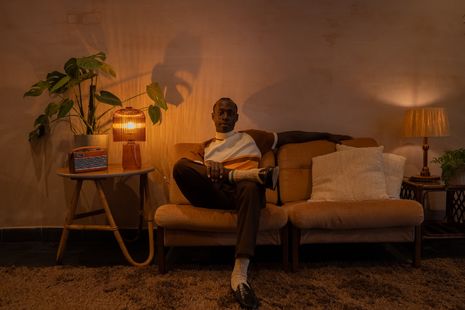Discussing optimism with David Larbi
Tara Buxton asks the author-influencer about happiness, poetry, and his journey to a creative career

If there’s anything you associate with David Larbi, it’s probably joy. You might’ve seen him beaming with pride over his freshly-sprouted chilli pepper plant, or smilingly singing the praises of his colourful socks. Racking up millions of views on Instagram reels, the internet personality is known for diffusing delight, be it through poems, podcast episodes, or his new book, ‘Frequently Happy’. It goes without saying that, on the morning of our interview, I was confident that this conversation would be particularly cheerful.
“I think I am a naturally optimistic person,” David tells me at the beginning of our interview. “I live inside my own head so I haven’t seen the full spectrum, but I do tend to think glass-half-full, rather than glass-half-empty.” This attitude is strongly felt in his poems, which are imbued with playful rhythm and rhyme. He asserts that, “at its core, poetry is joy because of the free nature of expression that you have when you create it and consume it”. He remembers his book-editor’s comment that people from lower-income backgrounds consume the most poetry, and recalls his initial surprise: “coming from a low-income background myself, it strikes me that you might think of poetry as something that is out of reach, or a kind of frivolity. Really, it’s such an expression of joy that it appeals the most to the people that are the most in need of that joy.”
“By virtue of our existence, we all matter. So if we exist, we deserve a happy existence”
David has received criticism that the ‘Frequently Happy’ form of thinking, which champions finding happiness in the everyday, might require a certain level of privilege. Recently, at the Cambridge Literary Festival, an audience member asked him, “Can I really be frequently happy if I’m in survival mode?” “There’s a reason I didn’t call the book ’How to be Happy’,” David reminds his followers. “It’s not instructive or prescriptive. It’s an encouragement for everyone to realise that they are deserving of happiness, where they are, at this point in time. By virtue of our existence, we all matter. So if we exist, we deserve a happy existence. That’s how I look at it.”
Throughout our conversation, David usually pauses after my questions before delivering his answers with careful consideration. But when I ask him whether he believes that our societal understanding of discipline is problematic, he responds with urgency. “Yes, absolutely. Especially because I come from an African background, and things like discipline are core tenets of African parenting. When I was younger, if I wasn’t disciplined enough it would lead me to feel insufficient.”
“His path to becoming a content creator was far from simple”
As an adult, David has a different perspective: “I realised that the structures of discipline ultimately improve my life. I see now that my parents were trying to give me the tools so that I don’t struggle.” He observes that social media often purveys the narrative that you should create a new self that is “good enough” before offering an alternative view: “it’s much healthier to look at it as, you are deserving already: these are some techniques that will help you to feel that way.”
Nonetheless, for David, discipline isn’t the only method by which we find our footing. His path to becoming a content creator was far from simple, comprised of both creative and more traditional career pursuits. After completing a university degree in English and French, he was left uninspired by his initial job roles. However, he argues that positions that don’t align with your artistic desires can “add to creativity”. “When you learn that you have limited time to pursue your creative projects, limited time to enjoy them, there’s a level of execution that can come from that place. It’s like, unless I actually get to doing this thing, I’m going to have no time to do it.” So even though his previous jobs didn’t directly foster his artistic aims, he reminisces that “there was so much space for daydreaming, for jotting things down”.
His advice to students with creative aspirations is “to try everything” and to refrain from “waiting for the perfect circumstances to start”. “Pretty much anyone who has been creatively successful has had to do something they don’t enjoy to fund or fuel the thing that they actually want to do,” he stresses. David also emphasises the importance of creative variety and frequency, recounting his own trial-and-error projects, including a brief foray into music production. “Nothing creative is ever wasted, so get creating and start doing things that you enjoy. It might not be where you end up, but it’s a great place to start.”
The fruits of David’s consistent creative efforts are manifold. With over 800,000 followers on Instagram, he now hosts live podcast events, and recently spoke at the annual Cambridge Literary Festival. “It was one of the best days of my life. To be in a room with people who are there solely because of something you’ve created, to be able to look them in the eye and have a real conversation about things that matter to the both of you, is super super special.” As the US publication of ‘Frequently Happy’ draws closer, David pictures the younger version of himself to be “surprised, delighted, and very proud” of how far he has come. “I feel like I’m living in wildest dreams territory.”
 News / Colleges charge different rents for the same Castle Street accommodation2 March 2026
News / Colleges charge different rents for the same Castle Street accommodation2 March 2026 News / News in Brief: waterworks, wine woes, and workplace wins 1 March 2026
News / News in Brief: waterworks, wine woes, and workplace wins 1 March 2026 News / Climate activists protest for ‘ethical careers policy’1 March 2026
News / Climate activists protest for ‘ethical careers policy’1 March 2026 News / Angela Merkel among Cambridge honorary degree nominees27 February 2026
News / Angela Merkel among Cambridge honorary degree nominees27 February 2026 News / Private school teacher who lied about Cambridge degree barred from teaching27 February 2026
News / Private school teacher who lied about Cambridge degree barred from teaching27 February 2026









